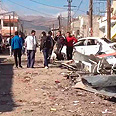
Syrian FM blames West for nation's suffering
Walid al-Moallem says US and European sanctions imposed on Damascus are to blame for suffering in his country
Syria's foreign minister blamed the suffering of his country's people on US and European sanctions imposed on his country, telling a top UN official Saturday that the international body should condemn these measures and work toward lifting them.
Officials in Damascus say UN humanitarian chief Valerie Amos during her one-day visit to Syria asked about the needs of Syrians after 21 months of conflict.
Related stories:
- US to send Patriots to Turkey following Syria Scud fire
- Russia acknowledges Assad losing control
- US blacklists al Qaeda-linked Syrian rebel group
The comments by Foreign Minister Walid al-Moallem and other officials however sought to deflect responsibility for the Syrian public's hardships on a wave of sanctions to punish President Bashar Assad's regime for its crackdown against protesters calling for democratic reforms, a crackdown that evolved into a civil war that has left more than 40,000 dead.
"The sanctions imposed by the United States and countries of the European Union on Syria are responsible for the suffering of the Syrian people," the state-run news agency SANA quoted al-Moallem as saying. The measures include a travel ban and freeze on the assets of Assad and other Syrian government leaders, along with an embargo on the oil and arms trades.
The battle to bring down Assad has already forced some 3 million Syrians from their homes, according to a new estimate, and cold, wet winter weather is making life increasingly unbearable for the displaced. Among those who left their homes are more than 500,000 who fled to neighboring countries. The UN does humanitarian work in both government- and rebel-controlled areas.
Amos met later in the day with Minister of National Reconciliation Ali Haidar who criticized the UN, saying, "It is exploiting this matter politically not as a humanitarian case." He said international organizations know "the needs of the Syrian people and should show readiness to distribute aid."
Defectors form opposition group
Also Saturday, Jabhat al-Nusra, an al-Qaeda-linked force that has proved to be one of the most successful fighting groups in the war against Assad, claimed responsibility for explosions that targeted the Interior Ministry in Damascus three days ago.
The three bombs collapsed walls of the Interior Ministry building on Wednesday and killed at least five people.
The Obama administration designated Jabhat al-Nusra a terrorist organization Monday, a day before it recognized the newly formed opposition Syrian National Coalition as the legitimate representatives of the Syrian people.
Meanwhile in Jordan, politicians who defected from the Syrian government announced from exile in the capital Amman the formation of a new opposition group, headed by Assad's ex-prime minister.
Deputy Oil Minister Abu Hussam Ad-Din and former diplomat to Belarus Farouk Taha said in a Saturday news conference in Amman that the National Free Coalition of the Workers of Syrian Government Institutions was formed to ensure that Syrian government institutions remain intact if Assad's regime collapses.
The group will be headed by former Prime Minister Riyad Hijab, one of the highest ranking officials to defect from Assad's regime during the conflict, according to Hijab's spokesman Mohamed Otari.
It also said it supports the Free Syrian Army and the Syrian National Coalition.
Violence continues
Activists reported heavy clashes and bombing south of the capital mostly in the southern neighborhood of Hajar Aswad and the nearby Palestinian refugee camp of Yarmouk.
The Britain-based Syrian Observatory for Human rights said Syrian rebels were fighting with "popular committees" in the Damascus-area Yarmouk, which are led by the Popular Front for the Liberation of Palestine-General Command. The PFLP-GC is led by Ahmed Jibril who is a strong ally of Assad.
The Palestinians are divided over the crisis in Syria. When Syria's unrest began in March 2011, the half-million-strong community struggled to stay on the sidelines. But in recent months, many Palestinians started supporting the uprising, although some insisted the opposition to the regime should be peaceful. A few groups with longstanding ties to the regime are fighting on the government side.
The Observatory also said the rebels and troops are still fighting in an infantry base in the northern city of Aleppo adding that opposition fighters have taken parts of it.
Syrian rebels have captured several large bases in areas near the Turkish border including the sprawling Sheik Suleiman base that was captured by rebels this week.
Activists also reported violence in other areas in the country including the village of Beit Saham, near Damascus' international airport.
- Receive Ynetnews updates directly to your desktop










